Scottish Oatcakes
Scottish Oatcakes are traditional savoury biscuits or crackers that are perfect with cheese. So easy and satisfying to make, I think they’re head and shoulders above shop bought ones. Containing just oats, salt, olive oil or butter plus water, you’ll be surprised just how good homemade Scottish Oatcakes are.
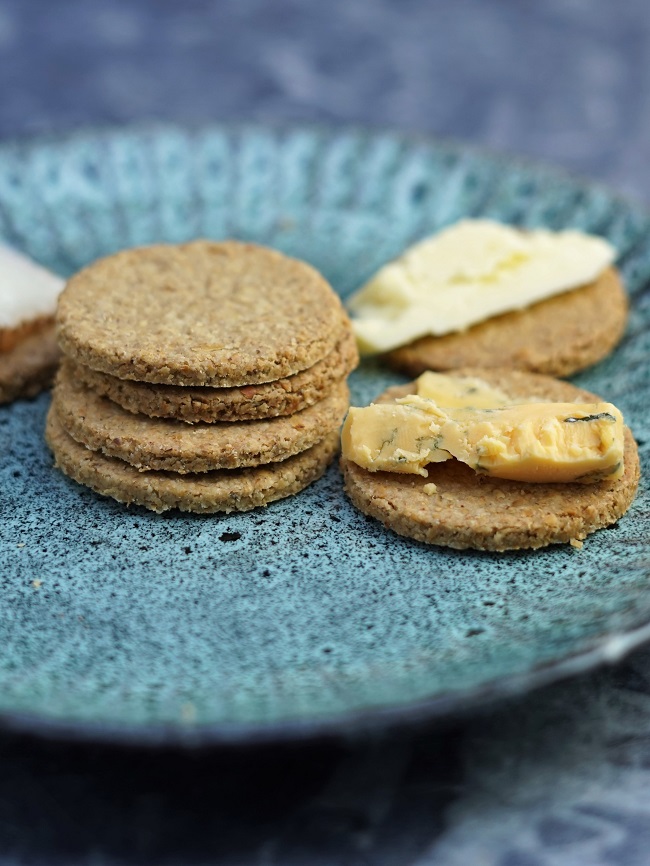
Disclosure: this post may contain affiliate links. If you buy via my links, I may earn a small commission at no extra cost to you.
Jump to Recipe
While some Scots may not like a Sassenach such as myself calling these savoury biscuits Scottish oatcakes, I really don’t have a choice. That’s because I live in north Staffordshire and if you say ‘oatcake’ here people immediately think of Staffordshire Oatcakes. Not biscuits, but oat pancakes often stuffed with bacon or sausage and cheese, usually eaten for breakfast.
So, although you may think of these simply as ‘oatcakes’, I really do have to call them Scottish Oatcakes.
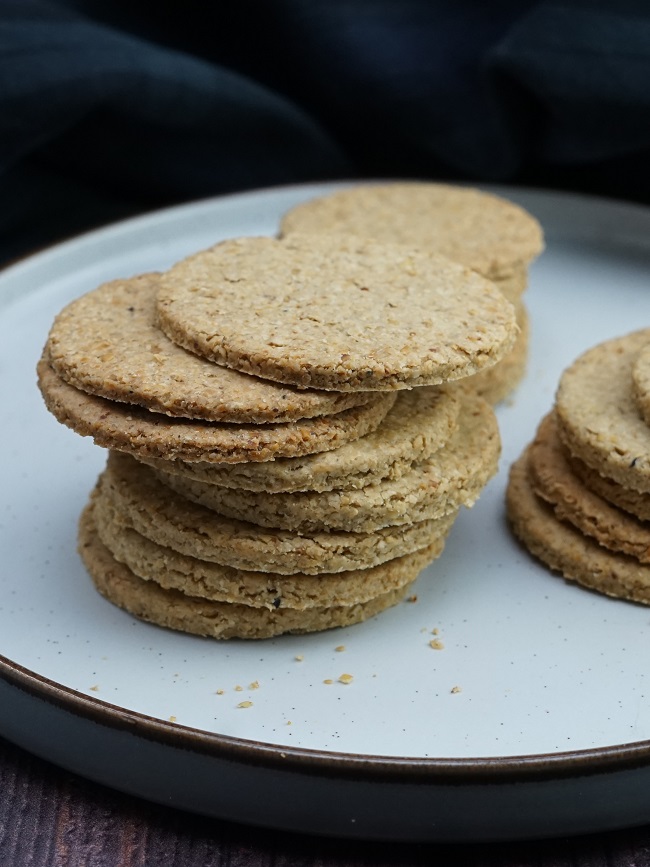
Oats became the staple cereal in Scotland due to the country’s cooler, damper conditions. This meant the land was better suited for growing oats rather than the wheat more common further south. Consequently, many oat-based dishes, including porridge and oatcakes, came to be associated with Scotland.
TYPES OF OATS
You’ve probably seen various types of oats and oatmeal in the shops. But it isn’t always obvious what the differences are. So, here’s my quick guide to all things oaty. The first stage in processing whole oats is to separate the kernels, or groats, from the outer husks. After cleaning and drying, these are prepared in various ways to create different products.
- PINHEAD, COARSE or STEEL CUT OATS These are the most minimally processed oats. Steel blades are used to cut the groats into pinhead sized pieces. These have a chewy texture and, if you’re making porridge with them, it’ll take longer to cook.
- MEDIUM & FINE OATMEAL These are made of ground oats, milled to different degree of fineness.
- ROLLED or JUMBO OATS Here the oats are steamed and then pressed between rollers. These are the oats I buy most of the time: they still have good texture but don’t take as long to cook as pinhead oats.
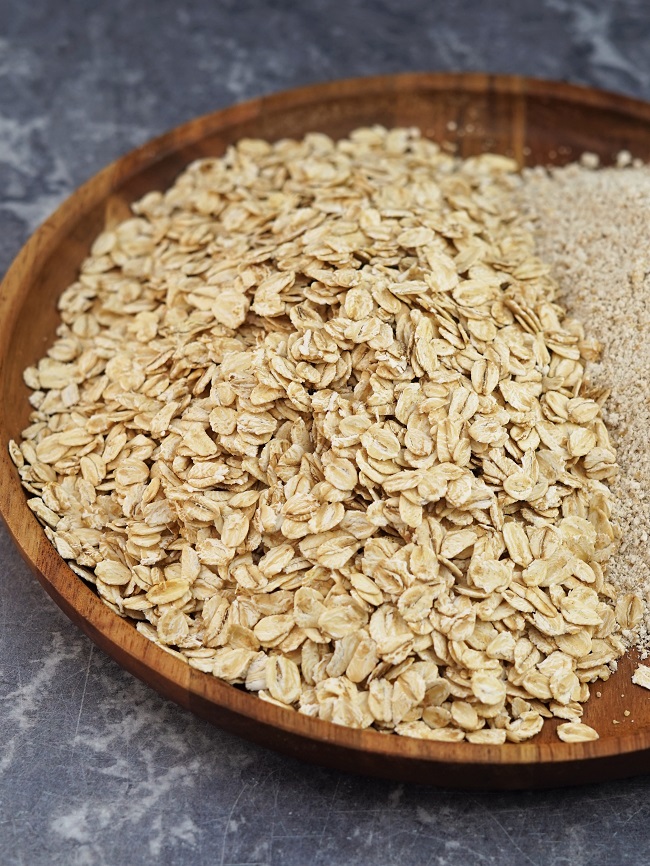
- PORRIDGE OATS These are processed in the same way as rolled or jumbo oats but are rolled thinner and flakier. When used for making porridge, I find them too smooth for my taste. But they do cook more quickly.
Faced with these different types of oat, the next question is obviously…
WHICH OATS CAN I USE FOR MAKING SCOTTISH OATCAKES?
The short answer is, any of them alone or in combination. Obviously, the finer oatmeal and porridge oats will give you a finer textured oatcake. Coarse or medium oatmeal plus rolled oats will create a ‘rougher’ one.
Tip: you can make your own oatmeal by whizzing up rolled or porridge oats in a food processor.
For the Scottish Oatcakes you see in this post, I used a combination of medium oatmeal and rolled oats. I whizzed up the rolled oats (in a coffee grinder, actually) but not too finely. I think it’s nice to have some largeish pieces of oat remaining for a rustic feel and more interesting texture.
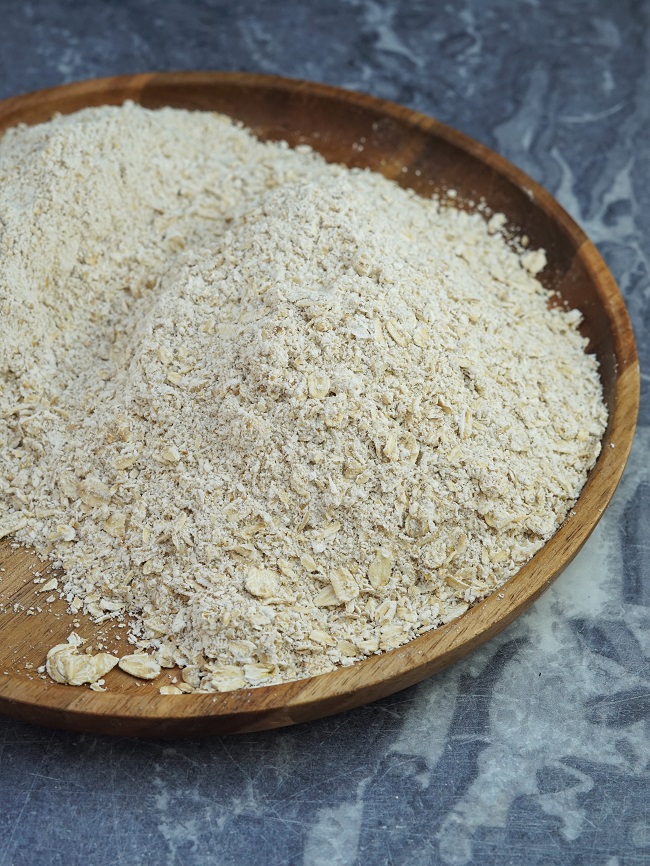
If you’re only going to buy one type of oat, then I’d go for rolled oats due to their versatility.
MAKING SCOTTISH OATCAKES
Making Scottish Oatcakes really is dead simple. All you do is season your oats/oatmeal with a little salt, then make a dough by adding olive oil or melted butter plus boiling water.
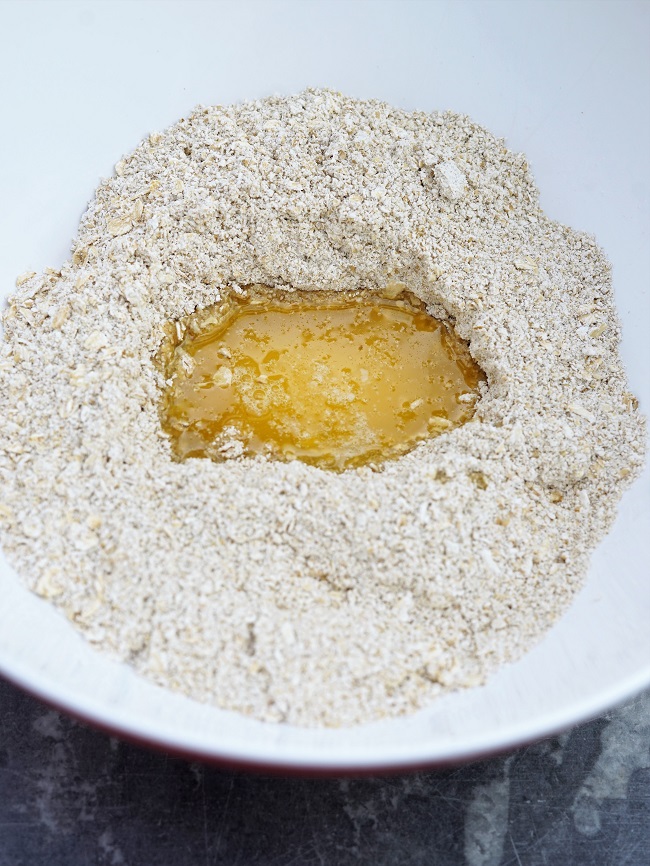
I’ve made some batches with olive oil and some with butter. Personally, I think there’s next to no difference. The ones with butter were perhaps slightly richer, but this was barely noticeable. Both versions had good flavour and were nicely crunchy. So just use whichever fat you prefer.
The dough should be firm but not sticky. I experimented with resting the dough, but found it became crumblier and more difficult to work with.
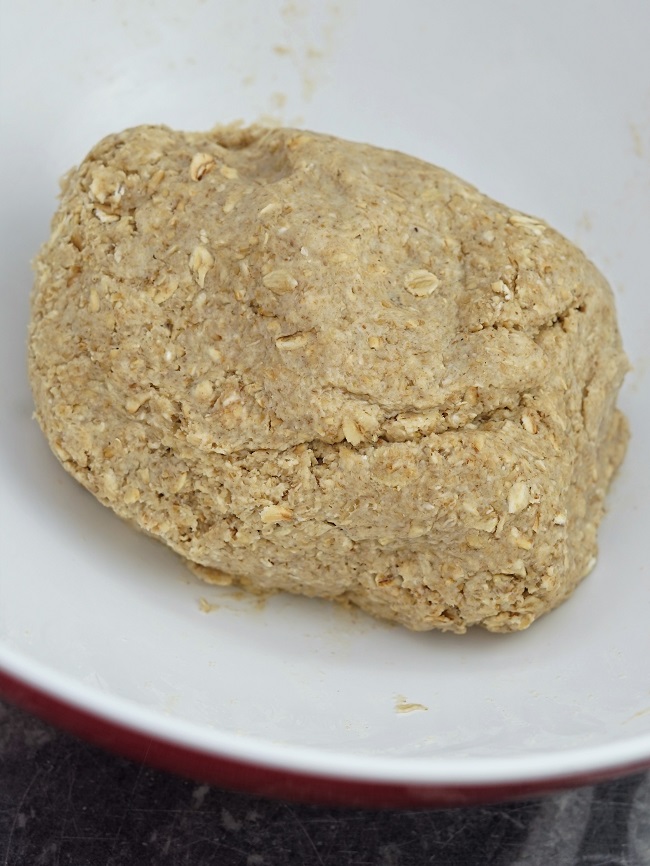
Dust your work surface, ideally covered with a silicone mat (paid link) with wholemeal flour (you could use more oatmeal but flour is less sticky), then roll out the dough no more than 3-5 mm thick. Cut out rounds 5-6 cm in diameter, re-rolling the scraps to make more oatcakes.
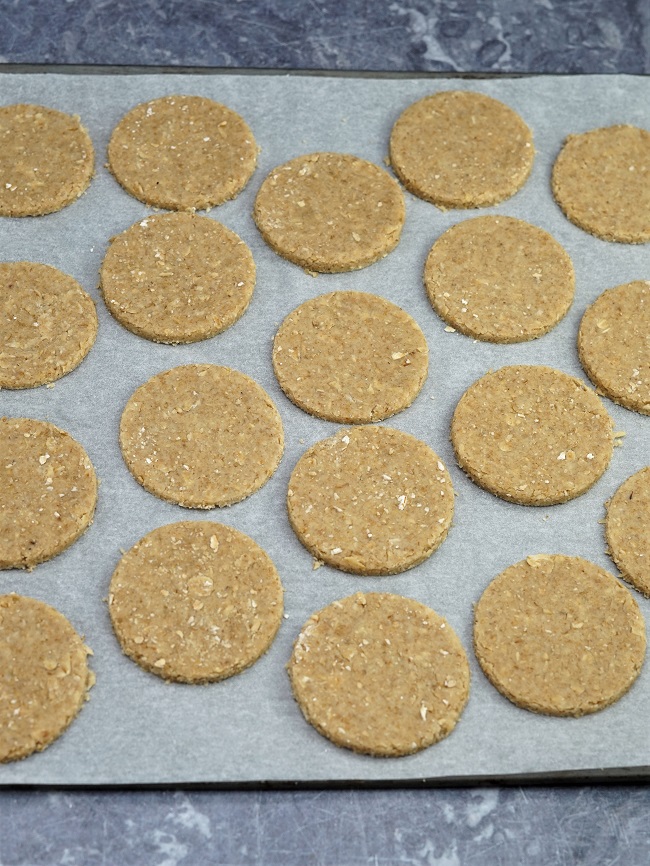
It’s worth noting that oats can be very ‘thirsty’. This means that when bringing together the dough scraps to re-roll, I almost always have to add a touch more water to prevent it going dry and crumbly. If, when rolling out, the edges start to split, just push everything back together and keep going.
Into the oven on a lined baking tray, Scottish Oatcakes should only take 30 minutes to cook. I turn them over after 20 minutes.
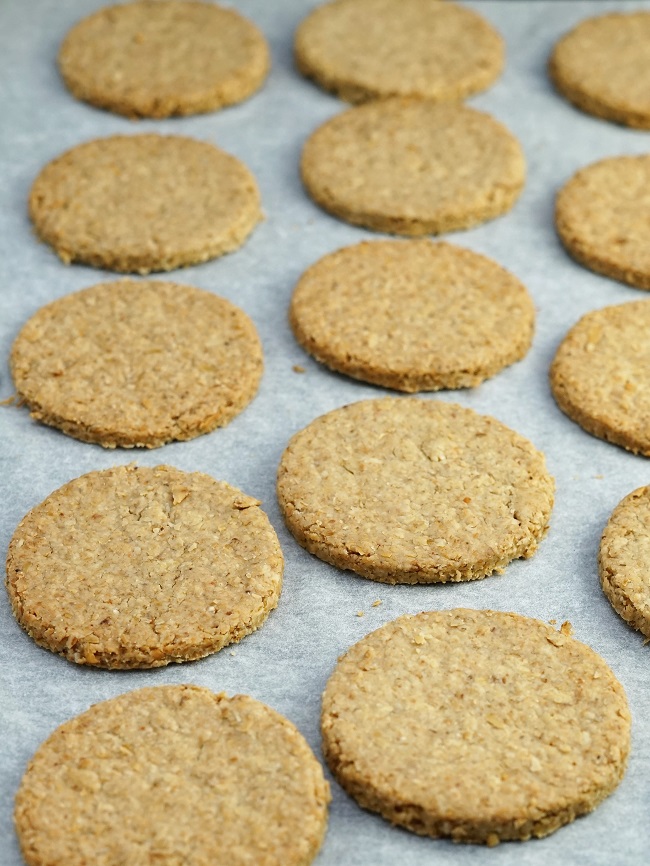
When they’re lightly golden and cooked all the way through, cool the oatcakes on a wire rack. Store in an airtight container when completely cold.
EATING SCOTTISH OATCAKES
Oatcakes were traditionally a major source of carbohydrate so would be served with all sorts of meals. They can also take the place of bread or toast at breakfast and are good alongside soups: maybe even a Scotch Broth?
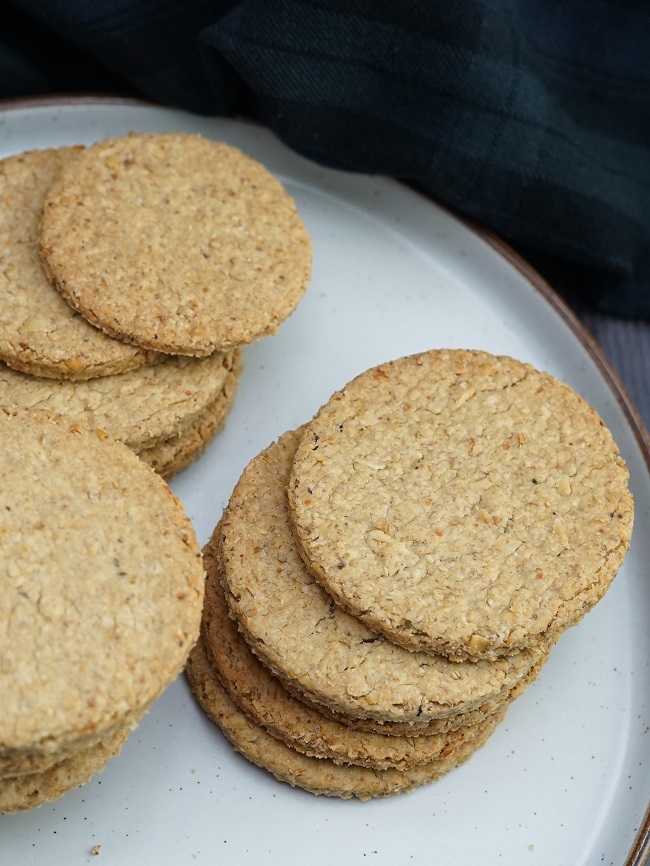
But I love Scottish Oatcakes best with some really good cheeses.
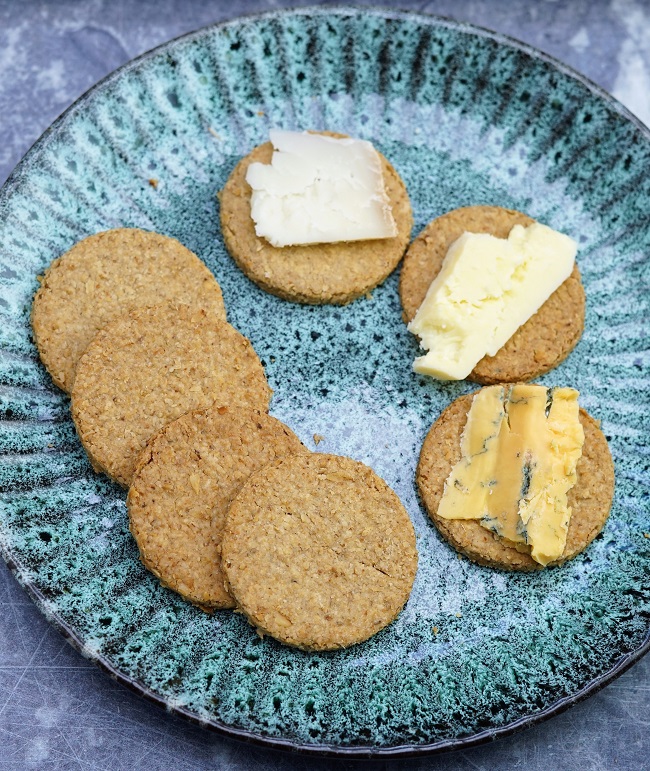
Here there’s two local ones from the Staffordshire Cheese Company: Buxton Blue and Cheddleton Original, plus a French sheep’s cheese.
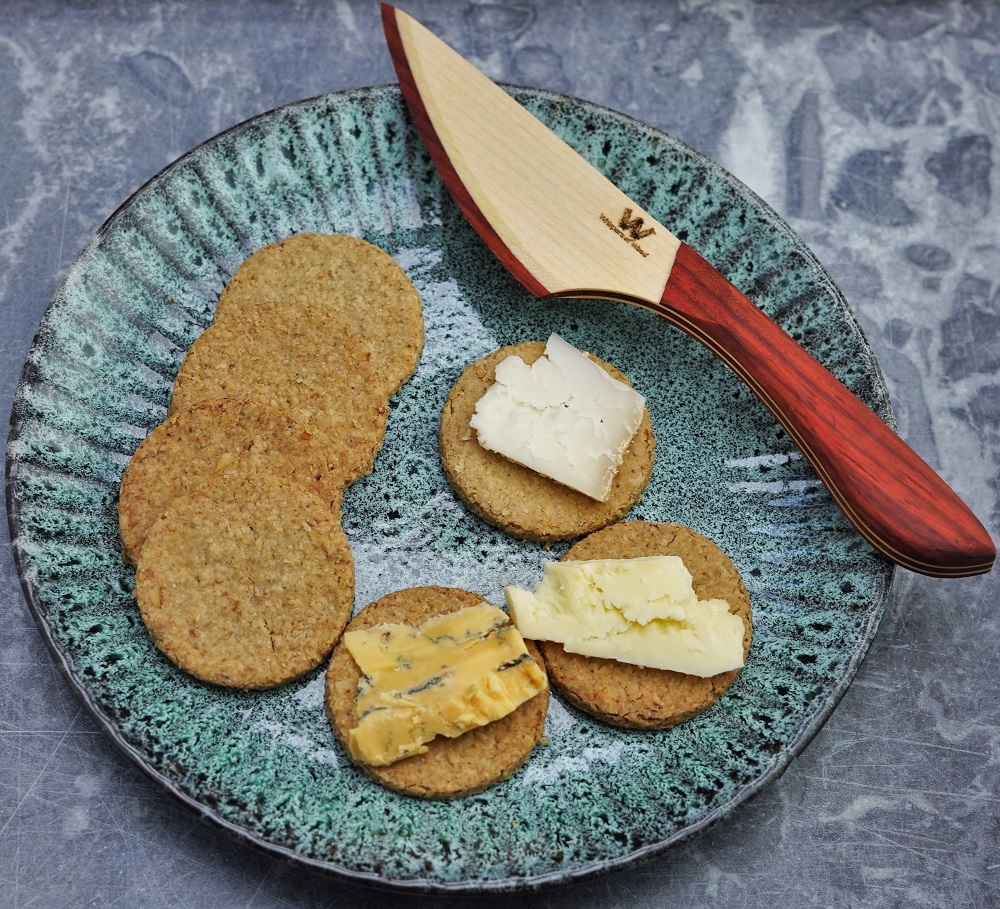
Smooth cream cheese is also a nice contrast to the pleasantly rough and rustic oatcakes. A blob of homemade chutney like my five-star rated Smoky Tomato- Chilli Chutney or Homemade Piccalilli makes it extra special.
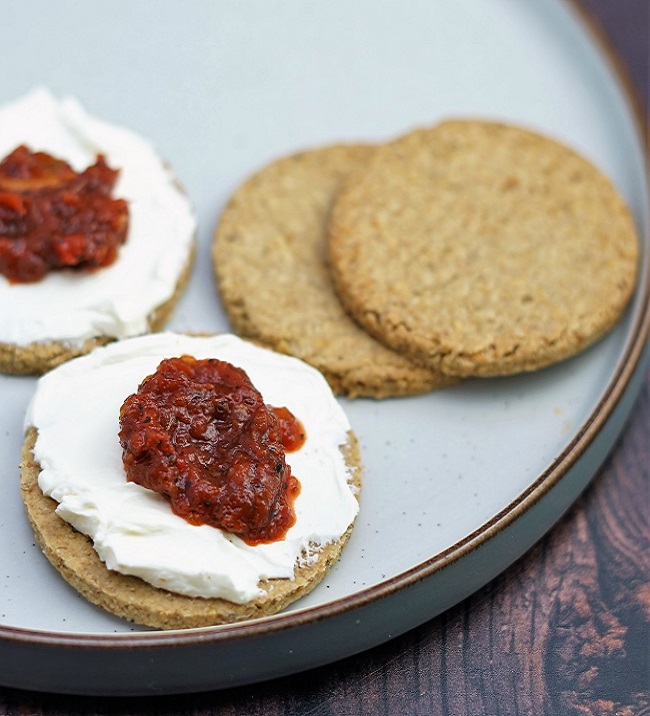
For a wonderful cheeseboard, serve local cheeses with Scottish Oatcakes plus a selection of Sourdough Crackers, Easy Homemade Crackers , Easy Seed Crackers and homemade chutneys.
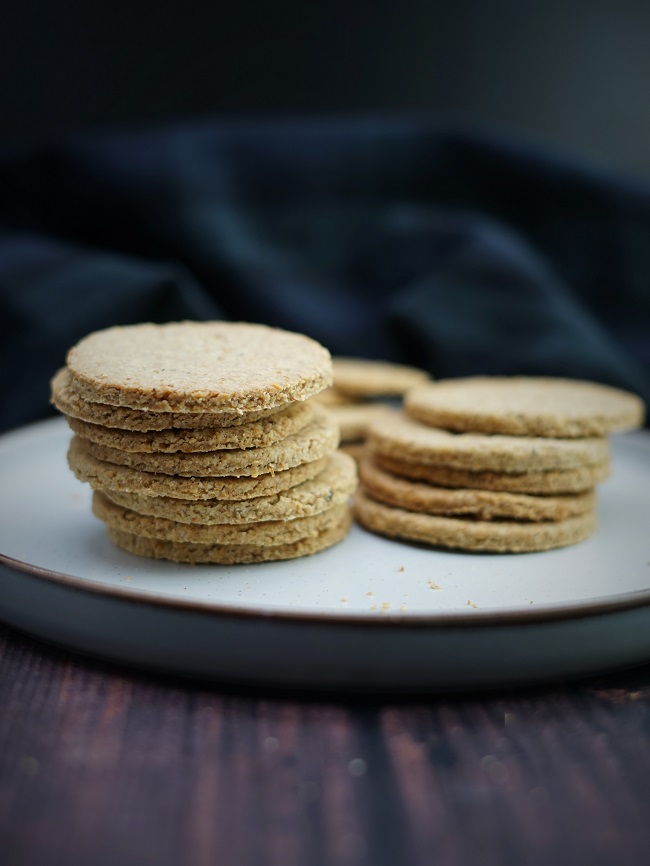
Or how about spreading on some homemade Potted Cheese flavoured with your choice of herbs, spices and booze?
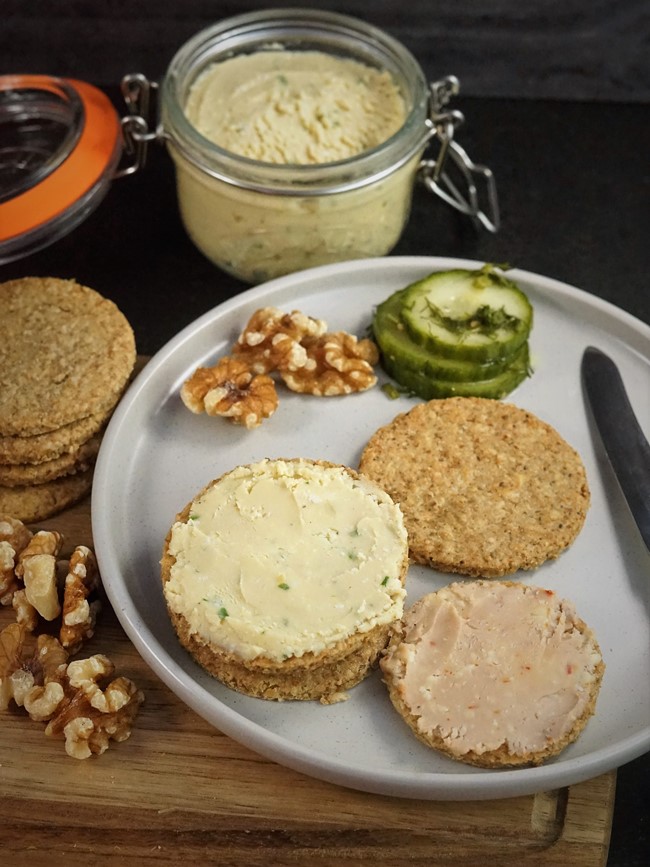
Of course, packet oatcakes, like other savoury crackers and biscuits, can be bought everywhere these days.
But, as with so many things, you can’t beat the flavour and satisfaction you get from homemade. You’ll also be avoiding the environmentally disastrous palm oil found in many brands of oatcake.
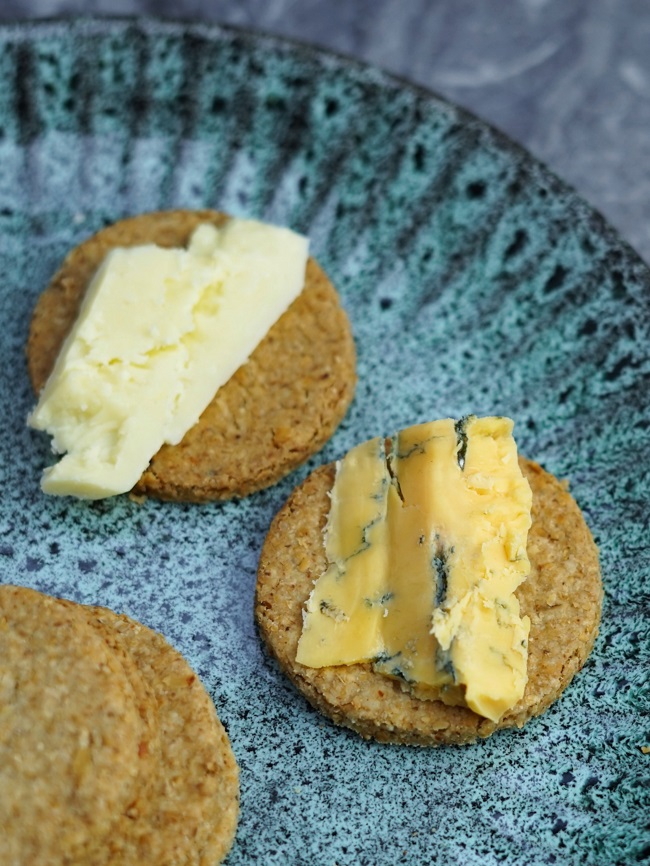
For very little effort and cost, you can enjoy wonderfully wholesome and delicious Scottish Oatcakes.
Have you made this Scottish Oatcakes recipe? Please do leave a comment and recipe rating.
MORE SCOTTISH OATCAKE RECIPES
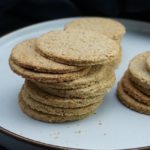
Scottish Oatcakes
Traditional savoury biscuits or crackers: perfect with cheese or to eat alongside soup.
It's recommended that you read the accompanying blog post before starting the recipe.
Ingredients
- 140 g rolled oats or porridge oats
- 140 g oatmeal (fine, medium or coarse) See Recipe Notes for making your own
- ¾ tsp salt
- 75 ml olive oil OR 75g butter, melted see Recipe Notes
- 100-150 ml boiling water
- wholemeal flour or oatmeal (wholemeal flour recommended as it's less sticky)
Instructions
-
Preheat the oven to 180C/160C Fan/Gas 4.
Line 2 baking trays with baking parchment or greaseproof paper.
-
Mix together the oats, oatmeal and salt in a bowl, then make a well in the centre.
-
Pour the olive oil or melted butter into the well, along with 100ml of the boiling water.
Stir quickly to bring the mixture together into a firm dough. Add more boiling water if necessary.
-
Ideally cover your work surface with a silicone mat, then sprinkle over a little wholemeal flour or oatmeal. Transfer the dough onto it.
Sprinkle the dough and a rolling pin with oatmeal and roll out to 3-5 mm thick, depending on how thick you'd like the oatcakes. If the dough starts to come apart at the edges, just push it back together with your hands. If the dough seems to dry, sprinkle with extra water.
Cut out oatcakes using a 6-7 cm cutter then transfer to the baking trays.
Bring together the scraps and re-roll to make more oatcakes until all the dough is used up.
The oat dough can be very 'thirsty': you will most likely need to add a little more water when bringing together the scraps.
-
Put the trays in the preheated oven and bake the oatcakes until lightly brown and cooked all the way through.
Unless you've rolled the dough very thick or very thin, this should take around 30 minutes. Turn over after the first 20 minutes for even browning.
-
Transfer the oatcakes to a wire rack to cool.
Store in an airtight container once completely cold.
Should keep for a least a month.
Recipe Notes
Note 1 You can make your own oatmeal using rolled oats or porridge oats: whizz in a food processor or blender until they're as fine or as coarse as you like.
Note 2 I've found little difference between oatcakes made with olive oil and those made with butter, so use whichever you prefer. 75g of butter melted isn't the exact equivalent of 75ml of olive oil but it makes little difference to the result.
Recipe based on one by Bill Cowie shared via Hugh Fearnley-Whittingstall.

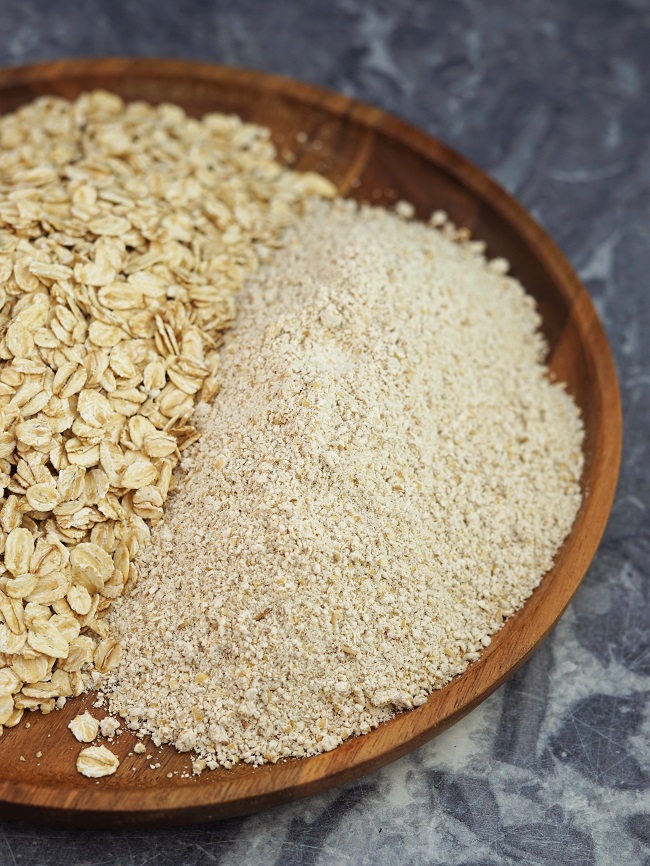
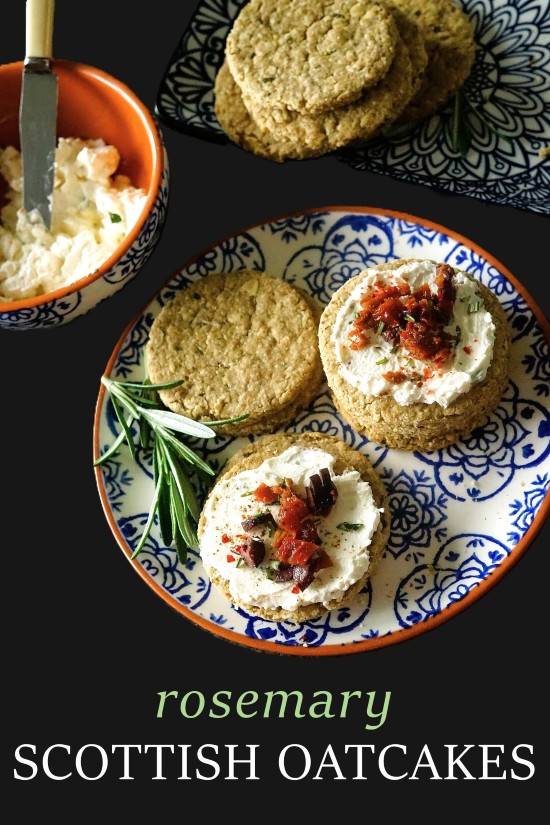
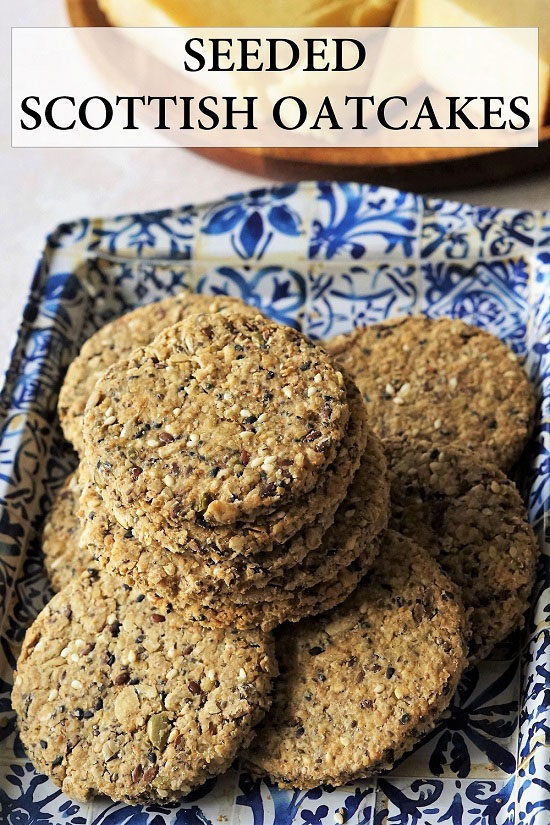
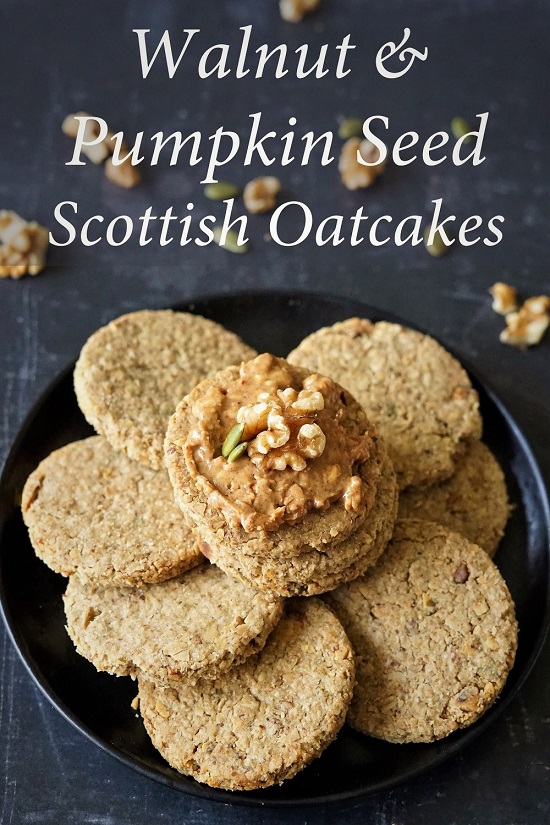
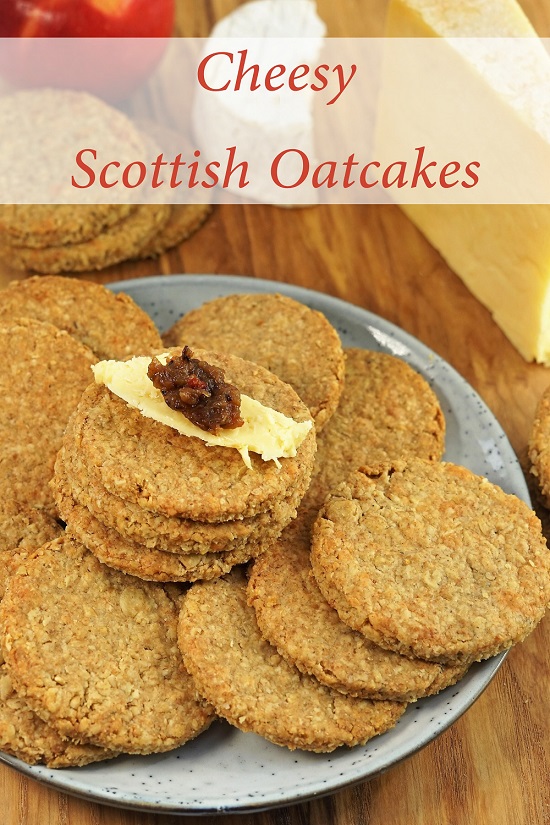
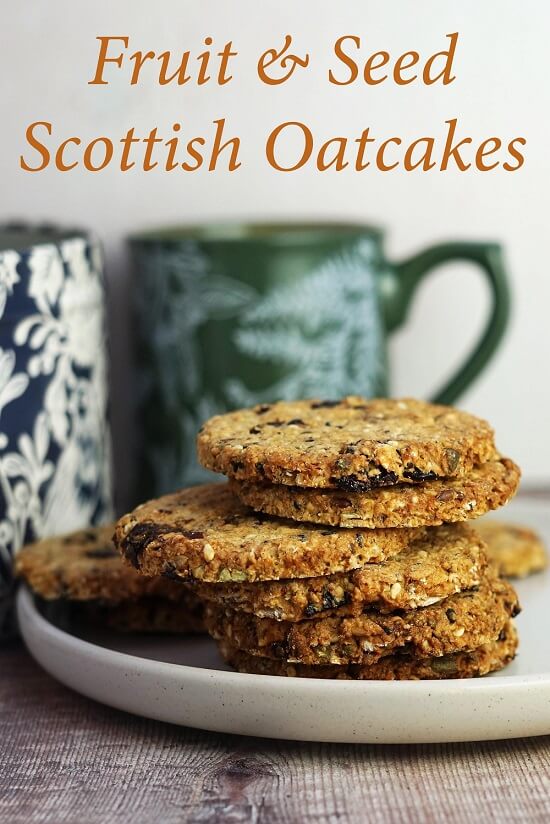

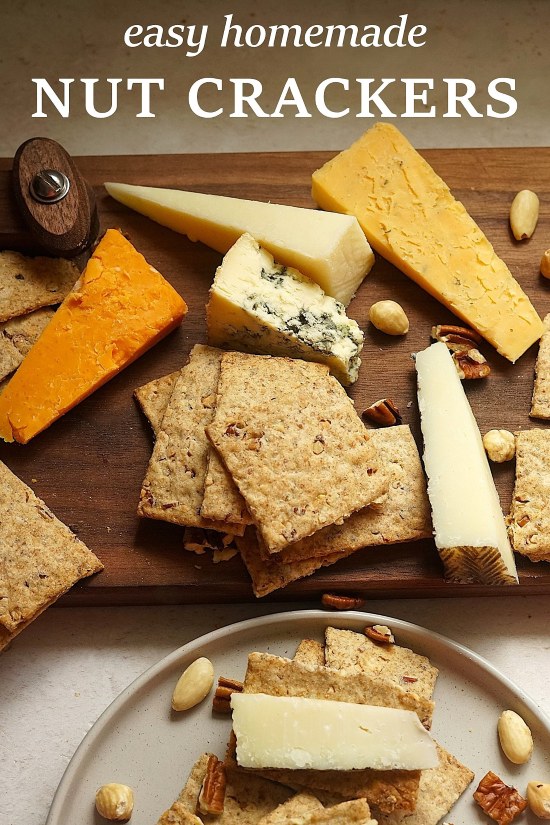
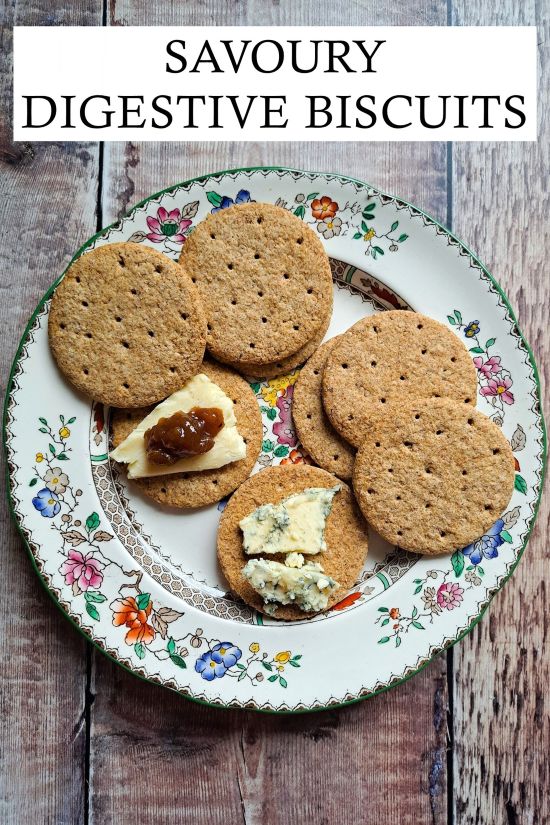

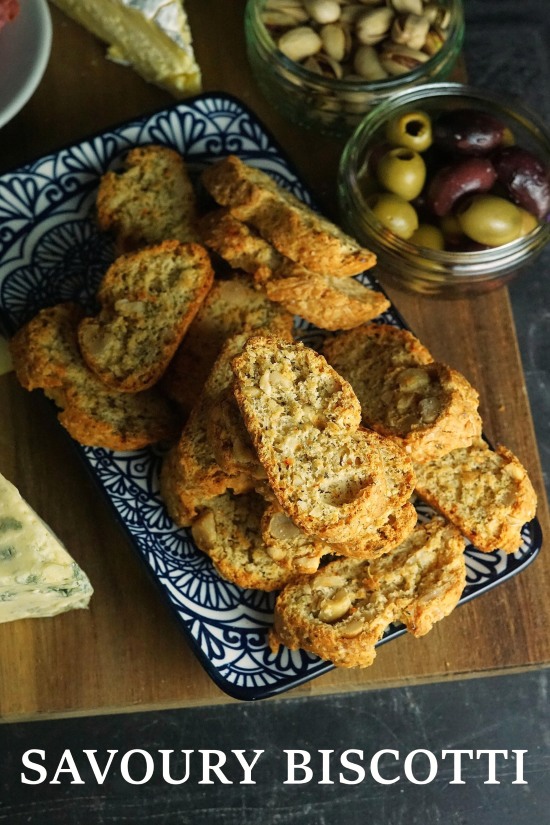
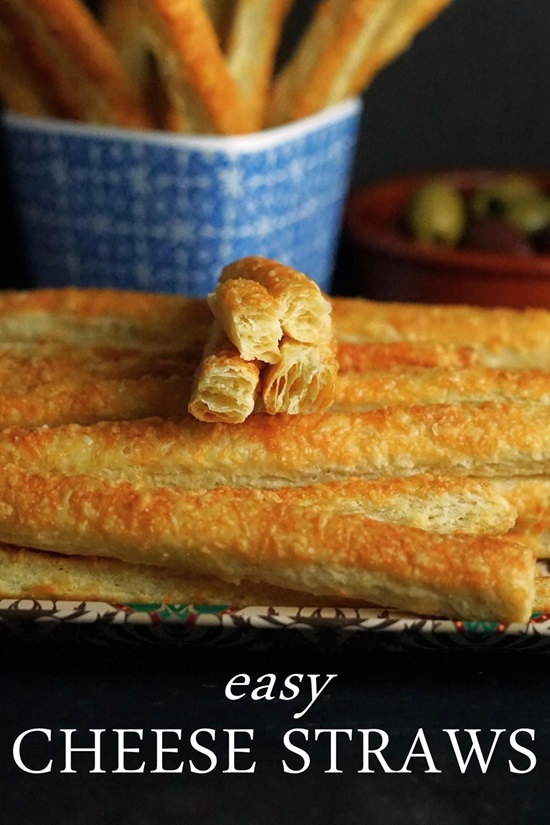
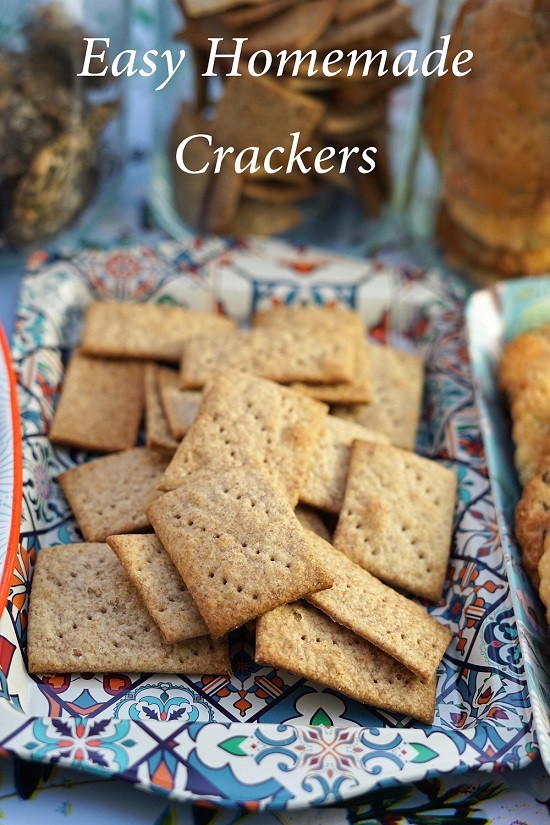
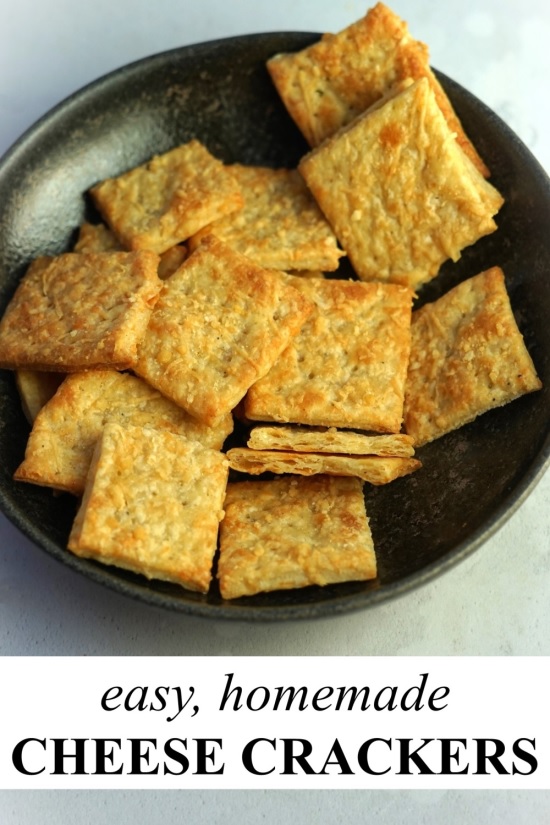
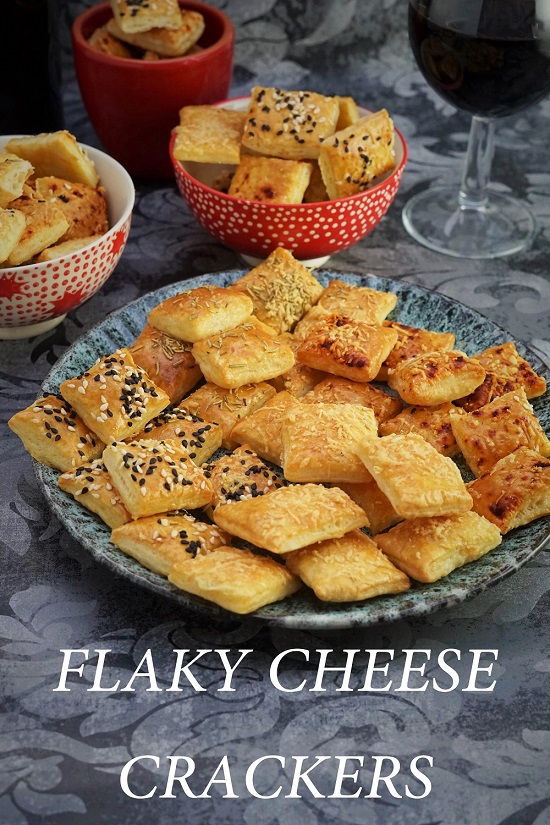
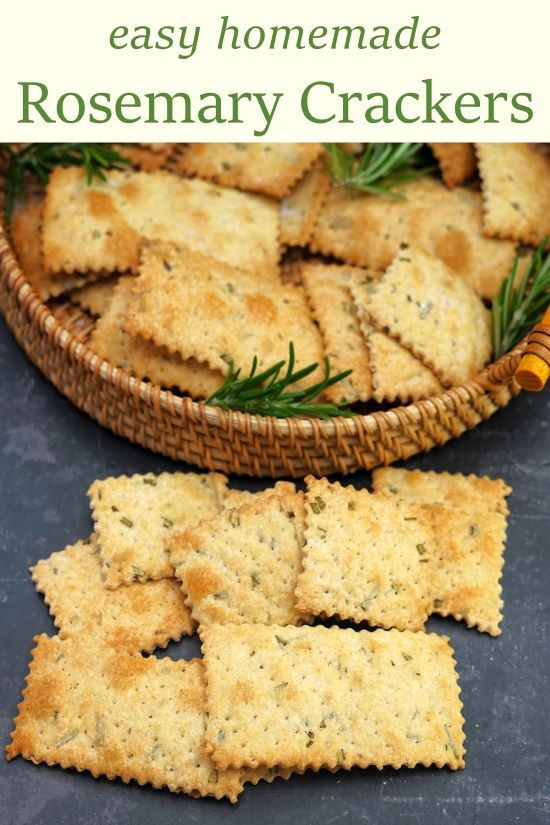
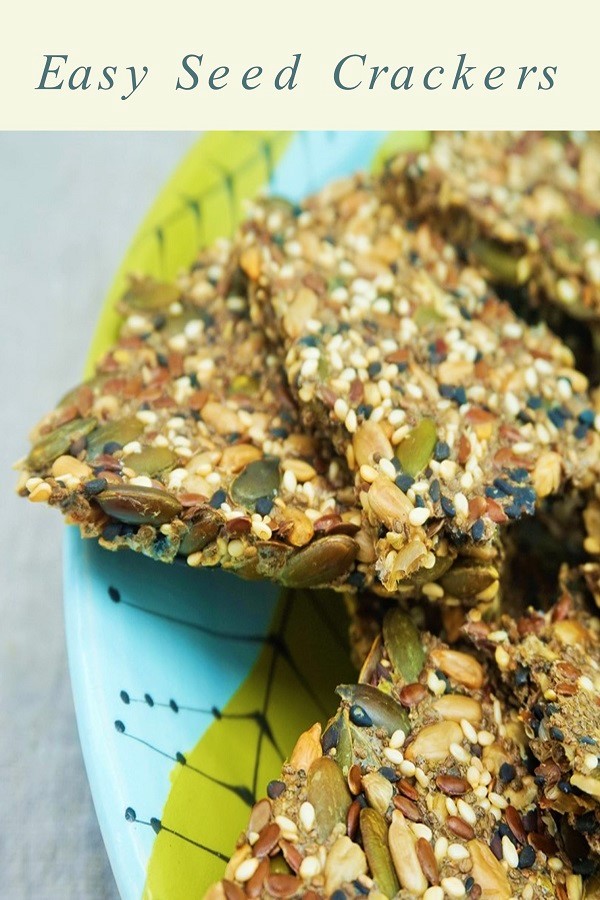
The best oatmeal biscuit recipe I’ve found, thank you. The hints you provide in the method are so useful; they made all the difference to me.
You’re most welcome and thank so much for taking the time to let me know!
Thank you for this recipe. I just cooked a half batch to try it out. I added 50g shredded parmesan and a hefty grind of black pepper ( 15-18 turns ). They are utterly delicious and I will certainly be coming back to the original recipe to make a range of variations. For those people who are dairy free, Macadamia oil is a neutral tasting alternative. Somewhat expensive but particularly good in recipes containing sugar .
Thanks for the great feedback, Den! Sp pleased to read that you found them utterly delicious 😋
I had made these once before, with butter, a while ago and thought they had a slight aftertaste but that they were worth trying again. The recipe is dead simple. This time I made two batches: one where I used the recipe as written but subbed in avocado oil and another where I used butter but subbed in flour from an American company called Anson Mills – they produce a gluten free flour that is 45% oats, 45% brown rice, and 10% sesame. I’ve been GF since 2011, and I have found this flour blend to be the best of all the ones I’ve tried. I suspect their shipping to the UK is probably stupidly expensive, but there seem to be a lot of American readers here, so it felt worth sharing.
Anyway – I can’t, in good conscience, recommend using avocado oil. My partner says he’ll eat that batch, but I think life is simply too short. The second batch is a lot better. I’m not sure I like them plain, but I specifically bought some Stilton to have with them, and then they were incredibly delicious. They were also quite good with some tinned salmon salad I had made the day before (make like tuna with lemon, celery, onion, and mayo, but also add dill – takes something tinned and elevates it to something special!).
Also, a note on measurements: I agree with the commenter who suggested getting a scale and just using the units of measurement in the recipe. The challenge, however, is ml: for water, you can sub grams for mililitres, but for oil, you can’t. My partner, an engineer, did the math for me, and apparently for avocado oil I should have used 68 g of oil to sub for 75 ml. The same conversion should work for olive oil, too, for those who might want this info. My partner thinks they’d be better with a hint of sugar, but I think that’s because he’s accustomed to Effie’s Oat Cakes, which are sold here in the US, and which are made with wheat flour and some sugar. i tend to think that they might be yummy with some sugar, but also that they might become a different thing with that addition.
Thanks so much for the recipe! I’m excited to try more of your recipes!
– Rachel S., near Boston, MA, USA
Thanks so much for your detailed feedback, Rachel! I’m sure much will be helpful for many of your fellow Americans. I agree that Scottish oatcakes are delicious with Stilton!
If you want to try an oat biscuit with a little sweetness which goes well with cheese and other savoury toppings, then you might like either my Savoury Digestive Biscuits https://moorlandseater.com/savoury-digestive-biscuits/ or slightly sweeter original Homemade Digestive Biscuits https://moorlandseater.com/homemade-digestive-biscuits/ They have a different texture to oatcakes but are very good!
Thanks again for getting in touch!
The whole is so much greater than the sum of its parts. The olive oil makes these so delicious! Thank you for a great recipe.
Thank you and you’re welcome!
Thank you for this recipe. I used oat flour with a little oatmeal plus the other ingredients listed and was very pleased with the handling of the dough and the final baked oatcakes.
You’re welcome, Andrew. Many thanks for the lovely feedback!
I love this recipe! It is my go to for Scottish oats cakes. With my oats I use the full 150 ml of boiling water and as suggested, lightly flour with whole wheat for shaping. Sometimes I add peanut butter powder for a slight variation and or a tbsp. of corn syrup but I always make this recipe the base for any additions.👍
Thanks so much for your great feedback, Gary!
What a fantastic recipe and so simple to make! They’re absolutely delicious and better than any you can buy.
Thank you, Lucy!
Fantastic! Whizzed up some mixed seeds and added them in, cut into small squares. Took a while to brown up, I used olive oil, do they have more golden colour if you use butter? Had them with a variety of cheeses and they were perfect, melt in the mouth!! Thank you!
Thanks for your lovely feedback! I haven’t noticed a difference in colour between ones made with olive oil and those with butter, but they are all quite light. You could bake longer for more colour, but I think that would spoil the texture.
Great recipe. My husband is intolerant to olive oil and me to dairy, so we use avocado oil and they are absolutely delicious. So much so that we made some as gifts to friends who appreciate cheese and biscuits…they went down a storm.
We’ve also made a cranberry and pistachio variation and I’m thinking or trying something with rosemary. Loved the idea one of your other commenter had of adding peanut butter. I also make orange or lemon crumb from organic citrus skins (dry the clean skins and then blitz in a coffee grinder, great to have on hand when you need peel for recipes)… that might be nice with honey.
You’ve unleashed the creativity monster! Thank you x
Thank you so much for your lovely feedback, Karen! I love your imagination and completely identify with a mind buzzing with ideas for variations once I find something I like! I’ve also thought of doing a rosemary flavoured one: a cross between the Scottish oatcake and my Rosemary Crackers https://moorlandseater.com/rosemary-crackers-recipe/
Thanks again for getting in touch.
p.s. if you have a moment, it would be great if you could give the recipe a star rating, please!
Hi There! We love these Scottish Oat Cakes! Just the right amount of sweetness and lots of good crunch! I tried the Fruit and Seeds Scottish Oat cakes and while they tasted great, I had a hard time keeping them together while rolling and cutting the biscuits. So next time I make them I think I’ll just spread the dough on the cookie sheet and make granola. Yum!
So glad to hear you love my Scottish Oatcakes!
With all the oatcake recipes, make sure you add enough water when making the dough and sprinkle over as much extra as needed when rolling out and bring together the scraps to make more. This is particularly important if, for the Fruit & Seed Oatcakes, you include particularly ‘thirsty’ seeds like chia and/or flax which can soak up several times their own weight in water.
Thanks so much for your feedback, Jean.
I want to add some topping how would that affect the bake? I’m afraid to try but I wanted to do the dried unsweetened coconut and some dark chocolate bits any tips would be greatly appreciated 🙂
I’ve never added toppings to my Scottish Oatcakes so can’t be sure if and how it would affect the bake. Maybe you could try it with just a few of a batch and see how it goes?
I made these following the recipe with olive oil but could not turn them after 20 minutes as they just crumbled. The finished biscuits tasted delicious but wouldn’t hold together. What do you think I did wrong? I will try again because they had a fabulous taste!
Hi Jackie, thank you for the 5-star rating!
Sorry to hear they crumbled on turning. It’s almost certainly because the dough was too dry. Oats are incredibly thirsty and, especially if you roll the dough on a heavily floured surface, you MUST splash with more water if it looks at all dry. I always add more water when re-rolling the scraps after cutting out too.
I hope you’ll give them another go as you enjoyed the flavour! 🙂
I tried this recipe and am hooked! I used butter and a 6cm cutter to make around 26 oatcakes. Fantastic flavour that is far better than anything I’ve bought from a shop. The bonus is no nasty additives (eg palm oil) and no packaging to get rid of. I’ll definitely be making these regularly!
So glad you enjoyed them Sarah, and thanks so much for taking the time to give your feedback!
These are so delicious and lovely! I’ve never had oatcakes before. I will be making these a lot. They come together in no time. Even though they are not even cool yet, all of my family members have tasted them and love them. Thank you for a great recipe!
Many thanks for your lovely feedback! ☺️
Can I have ingredients for American measurements, please?
I’ve tried converting before- difficult as sites give different measurements. I would like to try your recipe.
I used to be able to buy Walkers Oat Cakes at a local import shop but they no longer have them & can’t get them. Amazon has them too. But I’d rather make them myself- much better I’m sure.
Hi Sylvia, I’m afraid I also have no way of converting to American measurements other than via those websites which, as you say, can be tricky! I think that measuring oats by volume is particularly difficult as they can vary in size so much. So, my advice would be either to get a set of scales or just make a test half batch using your best estimate using those conversion sites.
Sorry I can’t be more helpful, but I’ve so many recipes on here I can’t possibly start manually converting them all. Hope you understand and thanks so much for your interest in my recipe.
Hi Sylvia. I’m an American who was forced in culinary school to learn the metric system. Now that I know how to use a scale and am comfortable with the metric system, I much prefer it. Just pick up a cheap scale that can measure ounces /pounds/grams/kilos and don’t bother converting the recipe,. Just do it in his measurements, it’s easier. Good luck! I have a batch in the oven right now.
Many thanks for your input Tina. I think scales really are the way to go!
Hi Sylvia, I have a set of battery powered scales that provide options with units. There’s a button to press so that you can choose to measure in grams or ounces. They were not very expensive. Just got them from K Mart
Finally a great recipe for Scottish Oatcakes. I’ve made oatcakes for years from a recipe of my Mom’s but they were 1/2 flour 1/2 porridge oats and a bit of sugar – otherwise pretty much the same but I really LOVE this new recipe. I love them crisp and thin and will make these again and again. So simple and quick! Scotch oats are really hard to come by and expensive in Canada but make my own out of buzzed large flake or quick oats works perfectly. THANKS!
Thank you for your lovely feedback 😊. I agree that thin and crispy is the way to go!
Doubled the recipe and they are going so fast I think next time I will quadruple the recipe. I did bake for 30min using convection as that seems to help with browning but they were still quite ‘pale’ even though crispy. Any suggestions?
If you want them darker, then you could turn up the heat and bake a few minutes longer. But do watch them carefully: you say they’re crispy so they must already be fully cooked and could burn easily.
Hope this helps!
I baked the oat biscuits (with butter) for the first time today. Actually, the biscuits were only meant for my wife, as she wanted them.
Now that I have tried these biscuits with original Stichelton, I am addicted to them. It is the perfect combination.
I used half finely ground organic oat flour and half lightly ground rolled oats.
Thank you for this excellent recipe. I will try the coconut cake recipe soon
Best regards from Berlin, Germany
Uwe
Thank you for your lovely feedback, Uwe! I had to look up Stichelton as I hadn’t heard of it but it does sound like it would be wonderful with the Scottish Oatcakes.
I hope you enjoy the coconut cake recipe just as much as it’s a particular favourite of mine.
Thank you again for getting in touch.
Stichelton is not easy to get, even in the UK. However, as a former chef and raw milk cheese dealer (now retired), I thankfully have my contacts.
Original unsweetened oatcakes are not easy to get in Berlin either (there is only one well-stocked shop with British products in the whole of Berlin) and they cost a fortune there. Also, these industrially produced oatcakes are nowhere near as good as the ones I baked according to your recipe.
A little tip on the side: if you also love blue cheese, try Spanish cabrales! The “strongest” blue cheese of all. Made from cow’s, goat’s and sheep’s milk.
Would you believe it, I HAVE eaten cabrales? I used to go to Spain a lot and in 2004 I holidayed in Cantabria and Asturias where I had it on a board of local cheeses. Interesting in small amounts but too strong for me!
Thank you once again for your kind comments on my recipe and for rating it.
Thanks for the recipe. Very easy to make and taste great. Much cheaper than buying from the supermarket.
Thank you for the lovely feedback, Diane. I much prefer homemade to packet oatcakes and, as you say, they work out much cheaper. So it’s a win-win!
Recipe easy to make and tastes great. I’m married to a Scot but I was brought up on Staffordshire oatcakes as some of my grandparents always had them when we visited. Make my own now as can’t seem to buy them anymore. They freeze great too. Always have with a fry up.
Thanks for taking the time to comment, Gill!
Really impressed with my first batch, even though I made them a bit too thick.
Made the second batch today using a bit more salt and resting the rolling pin on 2 pieces of 3mm plywood. My favourite cheese is Brie de Meaux from Lidl. The base of the wooden package is just 3mm, so result.
Thank you so much for sharing these recipes. Digestives next!!
You’re welcome, Denis! So glad you enjoyed the recipe ☺️
After more experimentation, our favourite addition so far is a heaped dessert spoon of dried Italian herbs.
Lovely to hear you’re continuing to enjoy the Scottish Oatcakes recipe, Denis! And your herby version sounds great.
Many thanks for taking the time to give your feedback.
Hi 👋Thank you so much for sharing your recipes. I have just made your oatcake recipe. I have taken Denis ‘s idea and added 1 tsp of Herbed du Provence. I went a step further and added a couple of tablespoons of grated Parnesan cheese. It is old and very hard so it was like grating a rock. But as I am a Yorkshire woman (and hate waste) I persisted. with the fine grating and now I have a ‘pebble size’ of it left and am still keeping the pebble to use up ‘somewhere’.🤣
I used olive oil and flax oil mixed (I didn’t have enough of either one tiniest use a single oil, I used medium oatmeal. They are still cooking and smell delucious. I will send a photo later. Thank you Ann x
Oh, they sound lovely! Hope they taste good too 🙂
I freeze Parmesan-Reggiano rinds, and any “hard” chunks that don’t grate well. I pop them into a pot of Minestrone Soup while it cooks–they add a wonderful depth of flavour to the soup.
How can I get to be buying Scottish oats in quantity?
I don’t know where you’re based, Patricia, but here in the UK oats are widely available in supermarkets, whole food stores etc.
Most often labelled ‘porridge oats’ and ‘rolled oats’ these can be whizzed in a food processor or even a coffee grinder until you get the consistency (fine, medium or coarse) that you want.